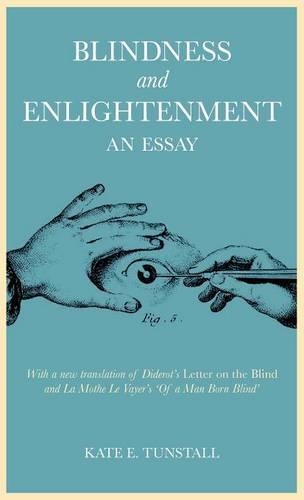
Blindness and Enlightenment: An Essay: With a new translation of Diderot's 'Letter on the Blind' and La Mothe Le Vayer's 'Of a Man Born Blind'
(Hardback)
Available Formats
Publishing Details
Blindness and Enlightenment: An Essay: With a new translation of Diderot's 'Letter on the Blind' and La Mothe Le Vayer's 'Of a Man Born Blind'
By (Author) Dr Kate E. Tunstall
Continuum Publishing Corporation
Continuum Publishing Corporation
20th October 2011
United States
Classifications
Tertiary Education
Non Fiction
Western philosophy: Enlightenment
848.509
Physical Properties
Hardback
256
Width 138mm, Height 216mm
Description
Blindness and Enlightenment presents a reading and a new translation of Diderot's Letter on the Blind. Diderot was the editor of the Encyclopdie, that Trojan horse of Enlightenment ideas, as well as a novelist, playwright, art critic and philosopher. His Letter on the Blind of 1749 is essential reading for anyone interested in Enlightenment philosophy or eighteenth-century literature because it contradicts a central assumption of Western literature and philosophy, and of the Enlightenment in particular, namely that moral and philosophical insight is dependent on seeing. Kate Tunstall's essay guides the reader through the Letter, its anecdotes, ideas and its conversational mode of presenting them, and it situates the Letter in relation both to the Encyclopedie and to a rich tradition of writing about and, most importantly, talking and listening to the blind.
Reviews
"Kate Tunstall's precise new translations of Denis Diderot's Lettre sur les aveugles and Franois de La Mothe Le Vayer's D'un aveugle-n' are most welcome resources for the Enlightenment scholar and teacher. Her introductory essay will prove to be even more useful, as it elegantly situates one of the most peculiar yet important of Diderot's early epistemological reflections in the complex of Enlightenment intellectual, theological and medical concepts that furnished its meaning and urgency for Diderot's contemporaries. Under Kate Tunstall's erudite treatment, the allusions, the ironies, the seeming confusion and the politically unsayable resolve into remarkable clarity. Just as importantly, Tunstall's own exposition is elegantly witty and delightfully playful, so we not only comprehend intellectually why this most disconcerting of Diderotian performances was scandalous. In her stylistic evocation of Diderot's voice, Kate Tunstall provides her modern audience with a readerly experience closer to that of Diderot's contemporaries so that we feel as a result something too often lost in this pragmatic age: how much of Diderot'sor any major author'smessage depends on a deeply literary culture. A work to be enjoyed on many levels, this book should be on every Enlightenment lover's bookshelf." -- Wilda Anderson, Professor of French, The John Hopkins University, USA
"Diderot's study of cognitive deprivation as a way of understanding cognition itself is one of the most innovative moves in a century of intellectual innovation. Kate Tunstall's brilliant new translation and edition, accompanied by a lucid, witty and incisive essay that initiates the reader admirably into the complex problems raised by the Letter, will be a major resource for anyone wishing to understand core issues in the Enlightenment." - Terence Cave, Emeritus Research Fellow, St John's College, University of Oxford, UK
"Diderot's Lettre sur les aveugles is one of the strangest and most powerful texts of the Enlightenment, an apparently rambling and jokey discussion of an abstruse philosophical problem, which culminates in a disturbing vision of a godless universe. Kate Tunstall's highly original and beautifully-written analysis is an outstanding treatment of its complexities, ironies, and anomalies, offering a much enriched understanding of the context in which it was produced and of its complex relations with a host of philosophical and literary texts." -- Michael Moriarty, Professor of French Literature and Thought, Queen Mary, University of London, UK
Author Bio
Kate E. Tunstall is University Lecturer in French at the University of Oxford and Fellow of Worcester College. She is Programme Director of Oxford's Besterman Centre for the Enlightenment, a Director of the Oxford Amnesty Lectures, and she co-authored and co-presented (with Caroline Warman) a series of BBC radio programmes on Diderot.
